The 8th Youth Chess Composing Challenge is on the way! The youngest contributors to chess art (born 2001 and younger) were offered three different sections to inspire their creations till June 10, with five special prizes of 500 Euros vouchers each for the best representatives of the five most successful countries.
The vouchers donated by the Fujairah government will be used for development of young talents, helping them to take part in the main WFCC events 2025: World Congress of Chess Composition, World Chess Solving Championship or European Chess Solving Championship. The results of the 8th YCCC will be announced on August 2, 2024, at the closing ceremony of the World Congress of Chess Composition in Jurmala.
The tradition of YCCC was established in 2016 to stimulate young minds and to mentor their work. In 2024 not less than 12 well known experts in the field (FIDE grandmasters, international masters and masters of chess composition) will be engaged to comment and evaluate creations of young participants from all around the world.
There are three sections: one with the set thematic condition, and two without any restrictions. The Section A is for original problems in 2 moves, with three adjacent black pawns in the same rank and the black King at least three ranks below them. In the solution, each black pawn should move and allow a different mate by White.
Why was this unusual condition proposed? The primary goal is to invent something original, as a composer has to avoid repeating the same or very similar content his predecessors have created over more than 170 years of development of the orthodox #2. Searching through the databases is difficult, even for experienced composers. That’s why a very rarely explored pattern was selected.
To find such a pattern the Albrecht collection was used. The largest database for two-movers was founded by the late Herman Albrecht (on paper cards) and later extended by Hans-Dieter Leiss to classify around 85.000 #2s. Next, the huge voluntary work was done by the GM Composer Udo Degener to make the collection almost three times bigger, to digitalize it and make it a free online database!
At the moment, the Albrecht collection with almost 300,000 #2s by more than 15,000 composers, contains only five examples of the YCCC-8 thematic condition. All of them are presented and explained in the 8th YCCC Announcement, so there is plenty of room for originality. The five discovered examples present only three different locations of the black King (in relation to the pawns) out of 28 possible ones. It means that any presentation of the theme in remaining 25 matrices may be treated as a new record!
The main task for young composers will be to present maximal activity of black pawns (three variations with different mates in the solution are thematic minimum). When the numbers of variations are approximately equal, the tireless YCCC Judge David Shire will value other artistic and constructive features.
We present here one of the five examples, showing an unusual artistic approach. The author wanted and managed to present the pawns-only play. The 1st move of White, the threat, the defences and mates are all executed by pawns!
№1 Albert Servais Problem 1954 (v)
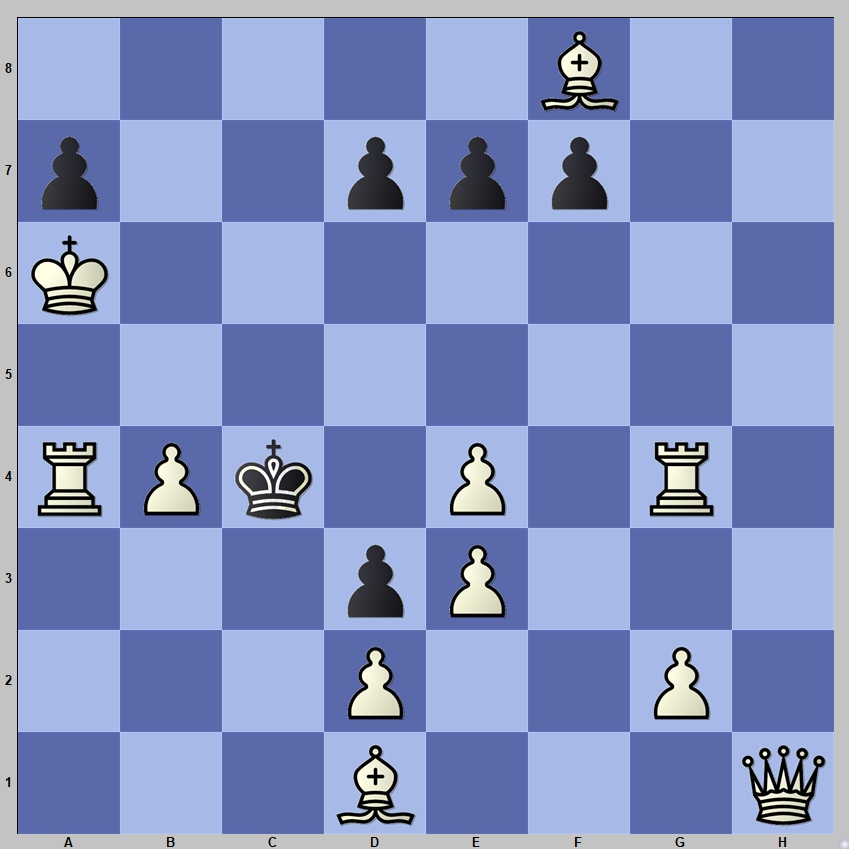
Mate in 2 moves
There is an eternal discussion if composing chess problems helps improving skills in any other activity. First of all, it improves solving skills to help better understand the internal structure of chess problems. Ural Khasanov (pictured below, born 2006) is currently the 4th solver in the world and the youngest one among the Top 40. His meteoric rise began in 2021, together with his first big successes in YCCC.
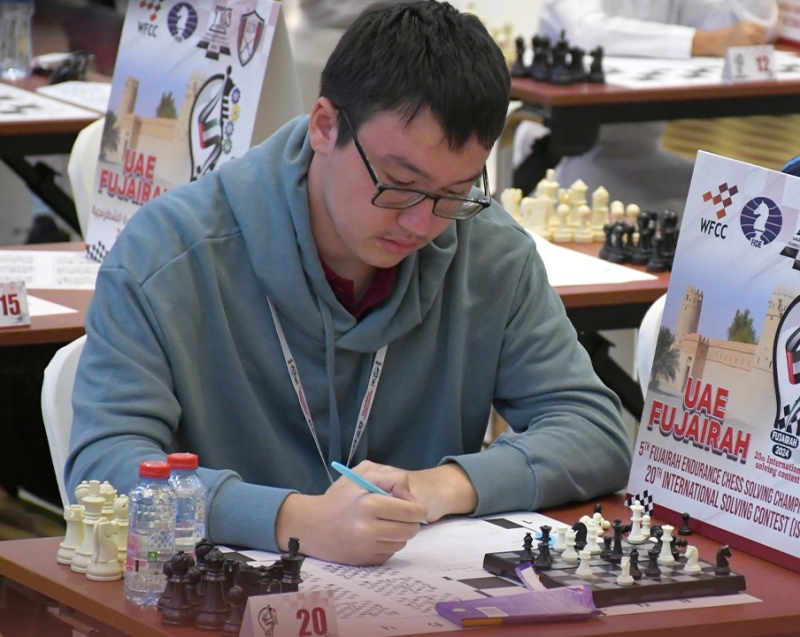 Photo: Fujairah Chess & Culture Club
Photo: Fujairah Chess & Culture Club
The thematic condition in the Section A of the 5th YCCC was to have all four Bishops in the corners in the initial position, and to use them in an intensive and interesting way. Ural managed to present four thematic tries activating all four Bishops. More than that, all four threats from the try play reappear as mates in the solution:
№2 Ural Khasanov, 1st Place YCCC-5 Section A, 2021
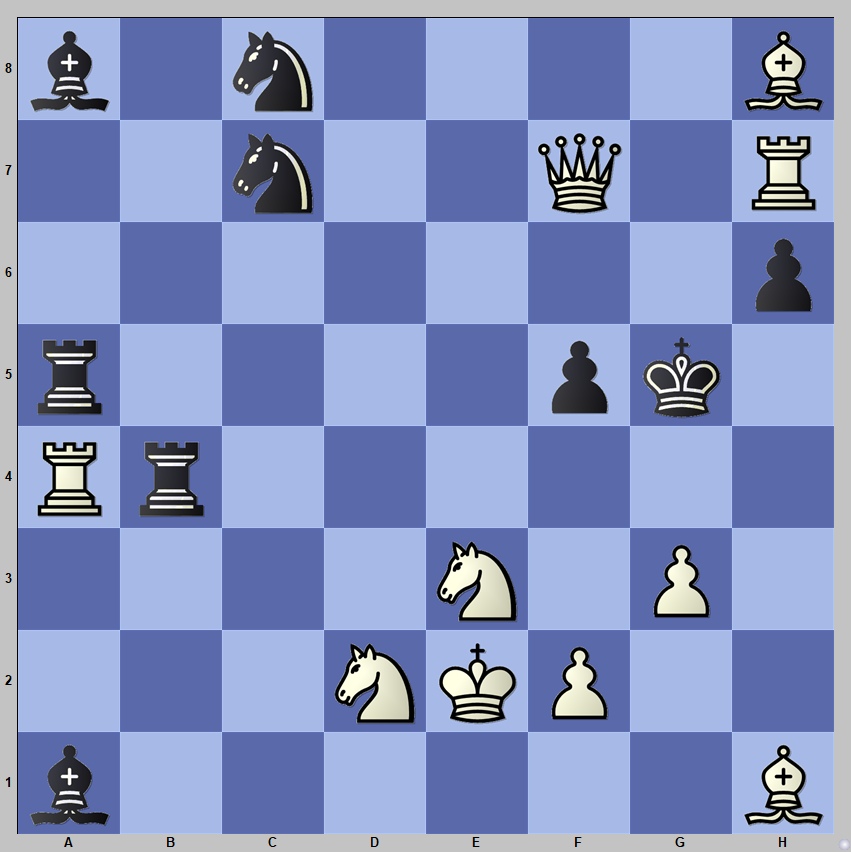
Mate in 2 moves
Later on, this #2 was included into the FIDE Album 2019-21, where the best compositions in 3-years cycles were selected. Getting into FIDE Album at the age of 15 is an historical achievement, but it didn’t break the record. For three years this record was held by the author of another YCCC success:
№3 Ilija Serafimović, 1st Place YCCC-3 Section B, 2018
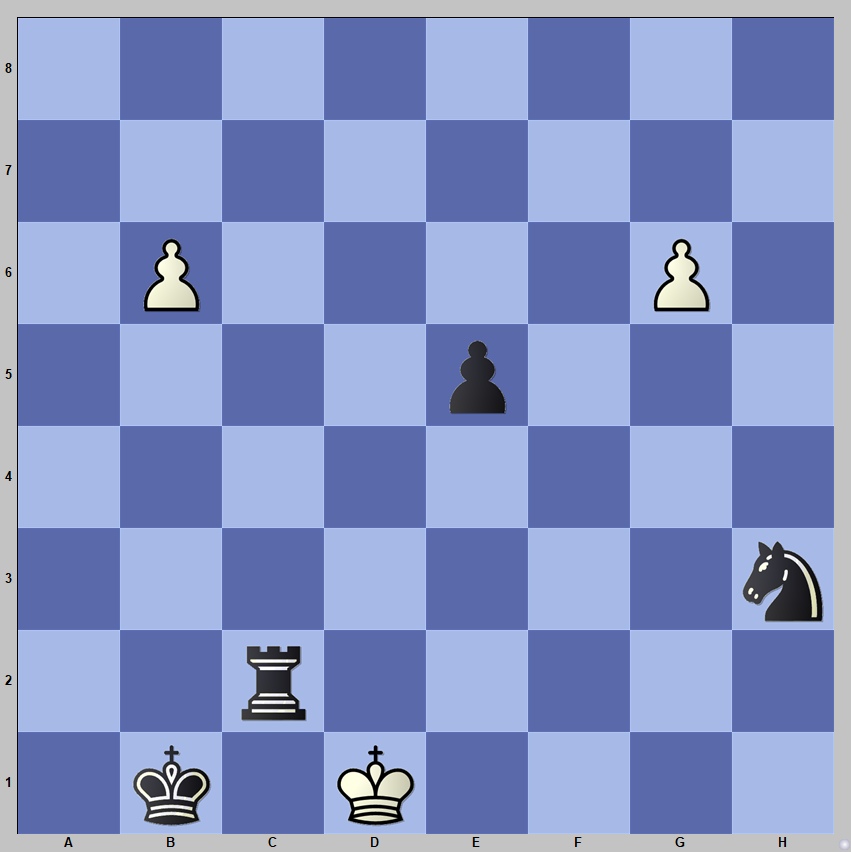
White to play and draw
In 2018 the endgame section of the 3rd YCCC asked for original endgames presenting sacrifice of white Queen (without capturing). The winning entry included two such sacrifices into interesting play of both sides, and rewarded the 14-years author Ilija Serafimović (pictured below, born 2004) with his first FIDE Album entry!
 Photo: Fujairah Chess & Culture Club
Photo: Fujairah Chess & Culture Club
Ilija is the most successful participant of the previous seven YCCCs. His starting interest was composing, but from 2018 on he understood he could solve very well, and is now among the best junior solvers in the world. In fact, the best solvers among juniors show the same tendency: 8 out of the Top 10, lead by the reigning World champion Danila Pavlov (pictured below) have got a composing experience in YCCC.
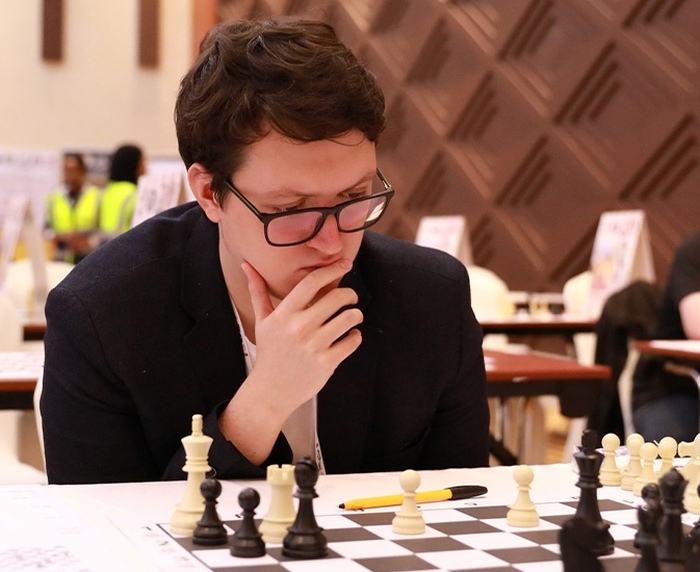 Photo: Fujairah Chess & Culture Club
Photo: Fujairah Chess & Culture Club
Are there composers among the young chess grandmasters? You might have heard Rameshbabu Praggnanandhaa quoting Oleg Pervakov, the multiple world champion in composing endgames, to be his favourite chess writer, but you probably didn’t know Pragg was also composing helpmates. His compatriot GM Karthikeyan Murali, known for fierce attacks, was taking part in YCCC too, again with helpmates. In general, Indian chess prodigies have wider chess composition culture than the younger generations from other countries.
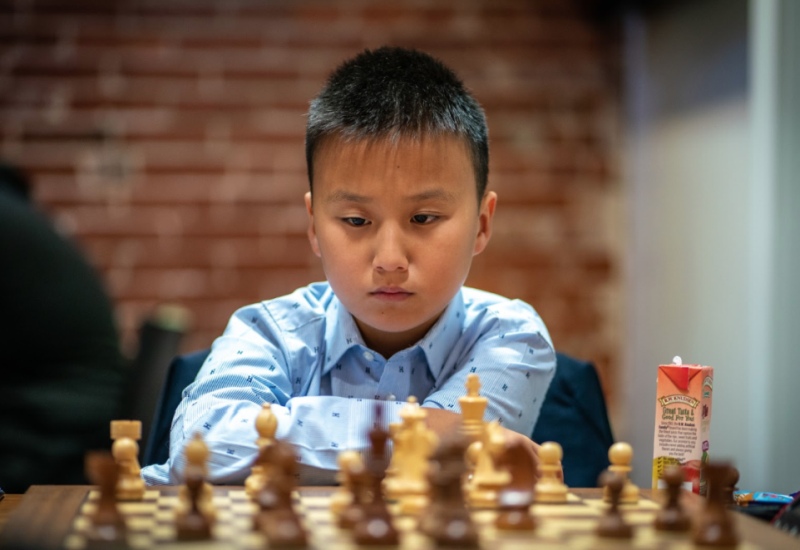 Photo: Eric Rosen
Photo: Eric Rosen
And, who is currently the youngest chess composer ever to get in the FIDE Album book? In the year 2019, at the time of becoming the youngest (at that time) International Master in the history of American chess, the current Grandmaster Christopher Woojin Yoo (pictured above, born 19th December 2006) broke another record. He was 12 years and 7 months at the time of sending entries for YCCC-4, and his winning endgame in Section C was selected for the FIDE Album 2019-21:
№4 Christopher Yoo, 1st Place YCCC-4 Section C 2019
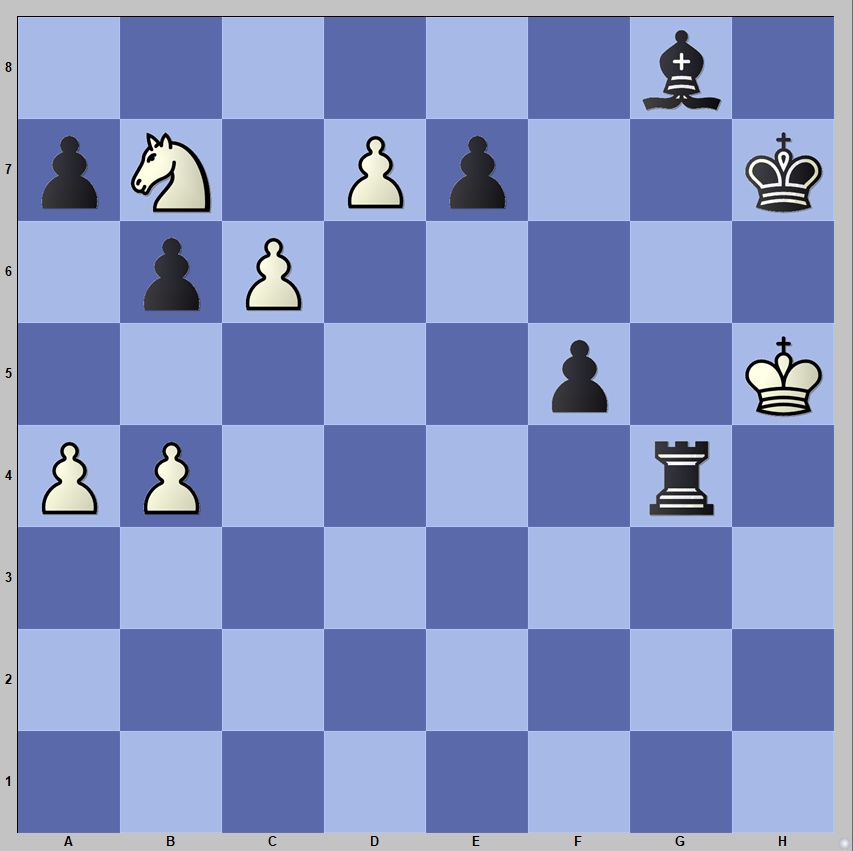
White to play and win
The set thematic condition was paradoxical and demanding one: White plays a piece to a square immediately in front of one of his pawns, without capture. Later on the piece moves away and the pawn promotes (on the same line).
This year, the 8th YCCC endgame section will have no thematic restrictions, and will be judged by two well-known experts Steffen Nielsen & Gady Costeff. In order to help participants discriminate artistic chess endgame from chess puzzles of all sorts that dominate Internet nowadays, the judges have prepared three articles by different grandmasters: a chess Grandmaster Johan Hellsten, a chess and solving Grandmaster John Nunn, and a composing Grandmaster Steffen Slumstrup Nielsen.
These articles are precious for all future chess composers:
1. Johan Hellsten: Composing endgame studies
2. John Nunn: Composing a study
3. Steffen Slumstrup Nielsen: Strip or massage? Two ways of creating studies from games
Finally, the Section C of the 8th YCCC is open to all genres of chess compositions (except endgames) and puts no restrictions to length and content. In order to compare the very different genres, nine expert judges will cooperate in analyzing, evaluating and marking the entries: Michel Caillaud, Ofer Comay, Gady Costeff, Vlaicu Crisan, Paz Einat, Hans Gruber, Seetharaman Kalyan, Michael McDowell, Andrey Selivanov, and Kjell Widlert.
YCCC Workshop is open for all the questions
All young participants are encouraged to join the YCCC Workshop and to consult experts about their entries. Mentorship in chess composition is extremely useful when it comes to questions of originality, and there are many other valuable advices one can get from an expert. In order to join the YCCC Workshop write to yccc@wfcc.ch (Subject: YCCC Questions), preferably before May 30. Give wings to your chess imagination and earn some valuable prizes!
Solutions:
№1 Albert Servais, Problem 1954 (v)
1.g3! threat: 2.e5# 1…d5 2.exd5# 1…e5 2.b5# 1…f5 2.exf5#
№2 Ural Khasanov, 1st Place YCCC-5 Section A, 2021
1.Be5? ~ 2.Rg7, Qf5 1…Ne7! 1.Bd5? ~ 2.Qf5, Nf3 1…Rf4!
1.Be4? ~ 2.Nf3, f4 1…fe! 1.Bd4? ~ 2.f4, Rg7(A) 1…Ne6!
1.Bg7! ~ 2.Bh6# 1…Bg7 2.Rg7# 1…Ra6 2.Qf5# 1…Bf3+ 2.Nf3# 1…Rb6 2.f4#
№3 Ilija Serafimović, 1st Place YCCC-3 Section B, 2018
1.b7 Nf2+ 2.Ke1 Nd3+ 3.Kd1 (3.Kf1? Rf2+! 4.Kg1 Rf8–+) 3…Rb2 4.g7 e4! 5.g8Q e3! 6.Qg2! Thematic move (6.b8Q? e2#) 6…Rxg2 7.b8Q+ Rb2 8.Qh2! Thematic move (8.Qxb2+? Nxb2+! 9.Ke2 Nc4–+) 8…Nf2+ (8…Rf2 9.Qb8+ Rb2 10.Qh2; 8…Rxh2 stalemate) 9.Ke1 Nd3+ 10.Kd1 Ka1 11.Qe2! [11.Qg2? Rb1+! 12.Kc2 (12.Ke2 Nf4+–+ fork) 12…Ne1+–+ fork] 11…Nf2+ 12.Kc1 Rb1+ 13.Kc2 Rb2+ 14.Kc1 Rxe2 stalemate.
№4 Christopher Yoo, 1st Place YCCC-4 Section C 2019
1. Nd8! The thematic move. 1. d8=Q? Bf7# 1. d8=N? Rc4 1… Kg7 (1… Rc4 2. Kg5) 2. c7 Bh7 3. Ne6+ Kf6 4. Nf8 (4. d8=Q? Bg6+ 5. Kh6 Rh4#) 4… Bg8 5. d8=N! (5. d8=Q? Bf7+ 6. Kh6 Rh4#) 5… Bf7+ (5… Rc4 6. Nd7+ Kg7 7. Nc5 bxc5 8. c8=Q) 6. Nxf7 Rc4 7. Nd6! Logical try 7. Nd7+ Ke6 8. Nc5+ Rxc5 9. bxc5 Kd7 10. Nd6 Kxc7! 7… exd6 8. Nd7+ Ke7 9. Nc5 Rxc5 10. bxc5 Kd7 11. cxd6 a6 12. Kg5+
Written by Marjan Kovačević, WFCC President
Official website: WFCC – World Federation for Chess Composition

